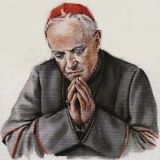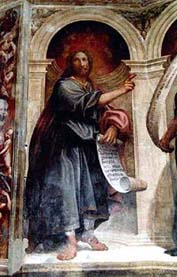 |
L'Eglise Aristotelicienne Romaine The Roman and Aristotelic Church
Forum RP de l'Eglise Aristotelicienne du jeu en ligne RR
Forum RP for the Aristotelic Church of the RK online game
 
|
| Voir le sujet précédent :: Voir le sujet suivant |
| Auteur |
Message |
Policarpo

Inscrit le: 16 Avr 2013
Messages: 1340
|
 Posté le: Ven Déc 07, 2018 6:52 pm Sujet du message: Hagiography of St. Origène Posté le: Ven Déc 07, 2018 6:52 pm Sujet du message: Hagiography of St. Origène |
 |
|
| Citation: | Hagiography of St. Origène
Chapter I - "The Early Years of Origène"

1 Origen was born in Alexandria, 185 years after the birth of Christos.
2 As his father, Léonide, was Aristotelian, the child had the rare, good fortune to grow up in an atmosphere immersed in the teachings of the Aristotelian Church.
3 He received his first lessons from his father and learned, like him, to meditate on the sacred texts. He was immediately fascinated by what he read and his ardor and zeal quickly revealed a great intelligence. When the Alexandrian priest met him at the request of Léonide, he was so impressed by the knowledge and mastery of the sacred texts that the child had already developed, he baptized him at the age of twelve.
4 A few years later, the Emperor Severus decided to prosecute Aristotelianism and its followers. Origène then saw his father arrested, tortured and executed. This tragic event profoundly affected his life.
5 He met Porcinia a rich woman of the city who proposed to keep him financially in exchange for his favors. Origène, who had other ideas in mind, rejected her. This one, who wanted revenge, fell into a pigs trough and died shortly after of violent stomach pains.
6 Instead of earthly possessions, the young man preferred a pure faith and above all respect for the Aristotelian Friendship which desires that every man should be concerned about the fate of others with empathy, charity, mutual help and love of their neighbour.
7 Some accused him of a lack of reciprocity in his relations with others because he gave a lot and received little in exchange. To those, he said:
8 "I certainly receive no riches in my relationships with others, but what I do not gain in obols, I will gain in love in my next life. All those who are destitute and whom I help give back to me a hundredfold by the friendship they return. My ultimate reward, I do not look for it down here, but in the Solar Paradise.”
9 And indeed, his greatest virtue was his generosity. To help the poorest, he funded the free distribution of bread and clothes, opened his door to those who had no roof to sleep under, and one day Origène even made perhaps the most difficult of sacrifices for a friend: at that time he had a large library of manuscripts, many of which were beautifully written, and in order to help his friend who had lost everything in a house fire, he sold them and received in exchange for these treasures a large sum which he gave to his friend.
10 His life, as a result of his generosity, was very simple. He dressed without luxury, ate only what he needed to live and slept on a simple pallet bed with only one blanket.
11 Some thought then that Origène rejected pleasure, namely man’s choice to work to create the conditions for his own happiness.
12 To these, he said:
13 "My taste for life exists more than ever, in any case I am not inactive and spiritually depressed, on the contrary, I am the happiest of men. By living simply and giving to others what I don’t need in my life, I can enjoy my time studying the sacred texts, there is nothing to distract me from what is the essence of my life and from my pleasure in knowing I am deepening my faith. Henceforth, to separate me from the material goods not key to my survival is nothing compared to what I can bring to my next life through my generosity. As it is written in Apathy by Spyosu, "Thus did the humans involuntarily discover the first sin. It later bore the name of Apathy. This sin consisted of being diverted from divine love, to give oneself over to the material life by neglecting the spiritual life, to be concerned with the present without thought for what Jah had designed us for." I refuse Apathy, for me, the key lies in the spiritual life, and by removing myself from the temptation of material goods, I am closer to Jah and his will." |
_________________
His Excellency the Most Reverend Monsignor Prof. Dr. theol. Policarpo von Wittelsbach
Bishop Emeritus of Regensburg
Archabbot Emeritus of the Abbey of Heiligenbronn
German archivist for the Roman registers of Sacraments
|
|
| Revenir en haut de page |
|
 |
|
|
Vous ne pouvez pas poster de nouveaux sujets dans ce forum
Vous ne pouvez pas répondre aux sujets dans ce forum
Vous ne pouvez pas éditer vos messages dans ce forum
Vous ne pouvez pas supprimer vos messages dans ce forum
Vous ne pouvez pas voter dans les sondages de ce forum
|
|





